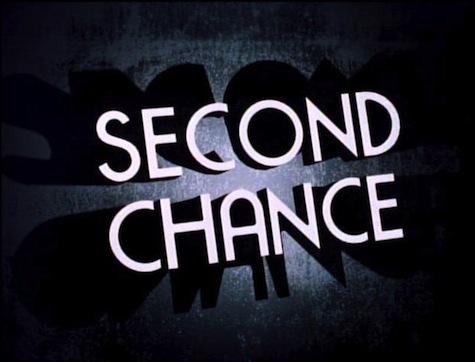“Second Chance”
Story by Paul Dini, Michael Reaves
Teleplay by Gerry Conway
Directed by Boyd Kirkland
Episode #80
Music Composed by Todd Hayen
Animation by Dong Yang Animation Co., LTD.
Original Air Date—September 17th, 1994
Plot: Someone kidnaps Two-Face just before he receives plastic surgery that will fix his face and, hopefully, heal his mind. Who could hate Harvey Dent so much they don’t want to see him reform?
By nature of his character, there are basically two Two-Face stories that any Batman series needs to tell. The one where DA Harvey Dent is scarred and turns to crime (i.e. “Two-Face”) and this one, where through plastic surgery and intensive therapy, Harvey is given a chance to reclaim his life, only for his second chance to be tragically ripped away. Harvey heals and re-loses his face in the comics all the time, including The Dark Knight Returns, Face the Face, and a fantastic short story in Batman: Black and White written and drawn by one Bruce Timm.
Two-Face is an incarnation of Batman’s failure to save his friend specifically, and to stop crime in general. But Two-Face is also a walking symbol of hope, of the possibility that within every criminal is a good man trying to get out. Two-Face is the villain Batman must always try to save, and never give up on, even when Two-Face is super evil, and even though, by narrative conceit, Two-Face cannot possibly be saved.
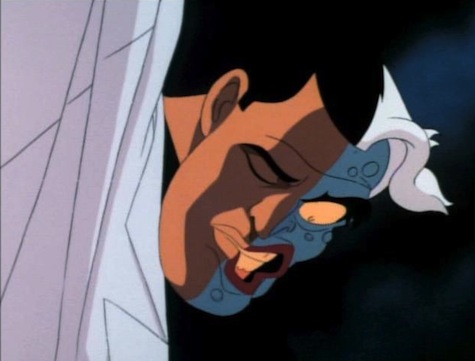
This whole episode broods, and Dong Yang Animation give a sense of weight to every character, building, and drop of rain. The “realness” of the characters gives even more emotional impact to the crashing trucks and fist fights in ruined towers lit only by lightning. The nightmarish sense of failure, of inevitable defeat, is everywhere. Batman and Robin are constantly falling, without ever hitting the ground. Boyd Kirkland dips back into the Hitchcock well for the style of the episode (Vertigo is definitely referenced in Todd Hayen’s score), which makes “Second Chance” one of the most beautiful and cinematic episodes.
“Second Chance” is a fantastic episode because it layers the psychological complexity, and the mental toll it takes on Batman, into a neat mystery: who hates Harvey Dent enough that they would stop him from reforming? The use of Rupert Thorne as a red herring is well done. Thorne has beef with Harvey Dent going back to before he became Two-Face, but it was Two-Face, not Dent, that destroyed Thorne’s operation and sent him to jail. The use of the Penguin is… not as good. Yes, the Penguin teaches birds to dance (because it’s Gotham and life is weird), and his hurt response to Batman’s accusation of treachery among the rogues is in character. But the Penguin’s shown no problem with Two-Face before, and the writers have to make up a motive for the Penguin that the Penguin himself dismisses. Poison Ivy or the Joker, on the other hand, might have worked better, since they’ve been show to constantly antagonize Two-Face. The Joker would be pissed at losing “one of the gang,” and Poison Ivy might still be trying to get revenge for her lost roses.
But of course the answer is only Two-Face hates himself that much. One starts to wonder about the quality of the doctors at Arkham. Not only has Harvey not improved, he’s actually gotten worse. Since his origin, Two-Face has had one personality: a fusion of Harvey Dent and his violent, angry side, Big Bad Harv. Now, Two-Face is a separate personality again, capable of acting against Harvey Dent without Harvey’s knowledge. When the doctor promises to “banish Two-Face permanently,” Harvey’s scarred eye pops open in fear, and when Harvey’s put to sleep, the scarred half stays awake, always watching.
Batman’s solution doesn’t help, either. Batman replaces Two-Face’s coin with an exact replica that always lands on edge, forcing the choice back onto Two-Face. But that only divides Two-Face further, because he’s of two minds about everything, and the coin toss was how he compromised with himself. Harvey Dent, in one voice, can ask Batman to save his life, and then Two-Face, in his other voice, can refuse, preferring to punch Batman in the face one more time then fall to his death. Once again, a great big hand for Richard Moll, who gives a performance that is vulnerable, sympathetic, and manic, while still menacing and brilliant and even a little charming. Two-Face’s defense that he stopped Harvey’s surgery because “he was going to destroy me” is quite justified, if you assume that, like Scarface, Two-Face is now truly a separate personality.
To me, the most interesting part of the episode is how it explores Batman’s relationship to Two-Face, and how that compares to his relationship to Robin. Bruce Wayne is Harvey Dent’s friend, the one who will never give up on him, and the one that brings him back to his normal self. By the end of the episode, Batman realizes that he needs to approach Two-Face as Bruce Wayne. Bruce draws out Harvey. Batman only draws out Two-Face. Also, Batman literally gets so distracted beating up thugs that he doesn’t see how close Two-Face is to killing himself until it’s too late, which is their whole relationship in a microcosm. It’s possible that Batman cannot be Bruce Wayne enough to actually save Harvey Dent.
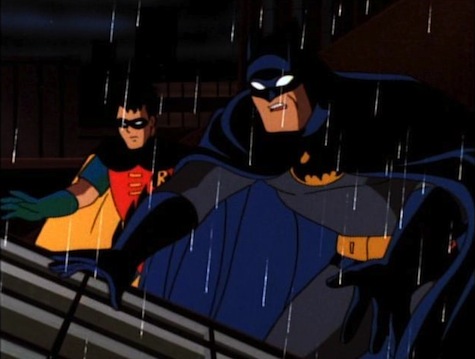
Robin is a little jealous of the attention Batman devotes to his old friend, as if Bruce and Dick were just friends instead of family, and Dick wants Bruce to pay him a little of the same attention he pays to Harvey. But then Bruce flips their relationship on its head, by saying that he relies on Robin the same way Harvey relies on Bruce. “Just like you’re always there for me” implies a lot of complicated psychology. For one thing, Bruce knows that he needs someone to save him, to keep him from completely becoming this crazy bat-person thing. That he can see Two-Face heading back into Arkham and knows he’s going to be there soon if Robin doesn’t anchor him. For another, Robin is probably a better friend to Batman than Bruce could ever be to Harvey Dent, or back to Robin again. Robin is more emotionally honest and available than Batman could ever be. And the way Robin supports Batman is often by ignoring his orders, as he does in “Robin’s Reckoning” and in this episode, which means that Batman has to trust that Robin knows what’s best for both of them. This chain of trust is illustrated when Two-Face, Batman, and Robin all fall from an exploding building, and we don’t see, we just know, that Batman WILL save Two-Face, and Robin WILL save Batman. It’s inevitable.
This is a great Robin episode, which is a little surprising because he’s clearly the third lead (or fourth depending on how you count Two-Face). But he never needs to be rescued, and in fact ends up saving Batman, and all of Two-Face’s goons, while smashing his way through cars, using unnecessarily tricky throws with his batarang, and still firing off a good one liner or two. And with the last line, Robin is elevated to a new position, that of ideal and beacon. In some ways, Batman is admitting that becoming Robin, getting closer to the balance of light and dark, superheroics and real life, that Robin has, is something Bruce strives for, even if he will never actually achieve it.
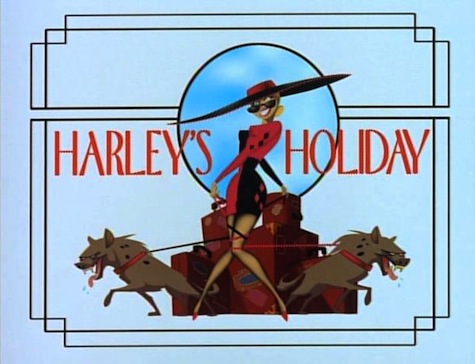
“Harley’s Holiday”
Written by Paul Dini
Directed by Kevin Altieri
Episode #081
Music Composed by Lolita Ritmanis
Animation by Dong Yang Animation Co., LTD.
Original Airdate—October 15th, 1994
Plot: Harley Quinn tries to go straight, but a misunderstanding in a department store leads to accidental kidnapping, a madcap chase around Gotham, and a screwball comedy with a seriously dark underpinning.
“Harley’s Holiday” has almost the same plot as “Second Chance”—Arkham doctors declare a villain sane enough to re-enter society, but the villain’s inherent disorder reasserts itself, leading Batman on a destructive chase through Gotham. The themes are the same, loyalty and betrayal, obsession and mistrust, and ultimate, nihilistic self-destruction. And yet the tone is completely different.
“Second Chance” is all noir-ish melodrama, with tragic flashbacks, brooding rain, and dramatic lightning. “Harley’s Holiday” is a screwball comedy a la Bringing Up Baby, a madcap chase that escalates to a four-way crash between a convertible, a cop car, a fish truck, and a TANK. It’s a goofy episode, starting from the title card, full of bright neon colors and cartoonish, exaggerated facial expressions. The final fight among the billboards of Gotham turns into a Rube Goldberg pratfall with Harley comically flung through the air before barfing on Batman’s cape. Lolita Ritmanis provides a peppy, bonkers score for the proceedings, and Dong Yang Animation turns on a dime, providing a rubbery, bouncy animation job that’s a direct contrast to the solid, restrained, weighty animation they gave “Second Chance.” But all of the comedy is a mask for how goddamn tragic this episode actually is, because Harley Quinn is doomed. Doomed. Doomed. Doomed.
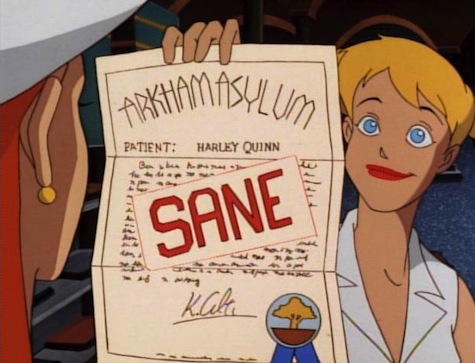
So, yeah, Harley Quinn is hysterical. While Veronica Vreeland isn’t quite the foil Batman himself is, Arleen Sorkin is having a grand old time playing a particularly clownish version of Harley, who refuses to take responsibility for all of the chaos she causes. She keeps saying she’s trying to play by the rules, but in fact she never does. She walks her hyenas down a crowded street, she responds to every setback by running away, and she complains about all the people chasing her as if she doesn’t have a hostage. She uses her “SANE” rating from Arkham as a shield, justifying her freedom. And Harley has a wonderful habit of inspiring clownish behaviors in others, either then men she pisses off to the point of mad pursuit, or Robin, who gets into the act by wielding fish as nunchucks.
But Harley is also hysterical, by which I mean she’s someone who loses self-control due to overwhelming fear. The moment that anything goes even a little bit wrong (she accidentally sets off shoplifting alarm at a store), Harley immediately starts beating people up, putting on her costume, and kidnapping heiresses. She also stops listening to people calmly explaining they know it’s an accident and if she just stopped running, she’d be forgiven. Everything that goes wrong in this episode (with the exception of General Vreeland deciding driving a tank through Gotham is a good idea) goes wrong because Harley is simply incapable of dealing with the outside world or taking responsibility for herself! The Arkham doctors should never have let her go free.
But not only is Harley doomed by her own insanity, she’s a little right that society has doomed her as well. Harley is acting out against a society that has taught women to, fundamentally, fear men. Once Harley sets off on her rampage, Batman, Robin, Batman as Bruce Wayne, and that poor security guard try, heroically try, to rationally talk Harley down, explain she can just stop what she’s doing and all will be forgiven, and Harley’s response is always violence and running away. The only man she “trusts” is Boxy Bennett, whom she thinks she can control with sexual promises, and ends up braining with a halibut. But she listens to Veronica Vreeland, even though Veronica basically repeats what Bruce Wayne says.
It doesn’t help that that all of the people chasing after Harley are men, acting like bullies and rabid dogs, which only reinforces Harley’s fear of men. And not just towards Harley, either. Boxy’s thugs leer threateningly at Veronica all the time, but the worst is General Vreeland, the representation of ultimate authority in Gotham. Not only is his the most over the top response to his daughter’s kidnapping, but he treats his daughter as a possession to be retrieved, not a person to be saved. It’s only after the fact that he realizes running over the car your daughter is in is NOT a way to save her. Maybe a female hero or cop, a Batgirl, Montoya, or even Catwoman, might have understood and known how to deal with a woman who is clearly acting in a way consistent with being the victim of a long-term systematically abusive relationship.
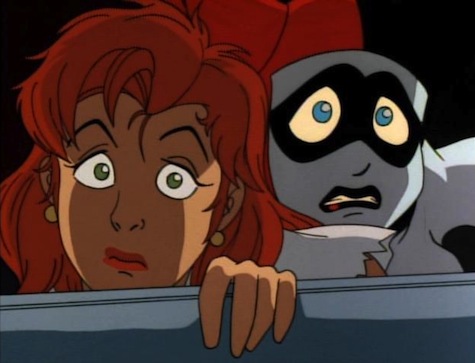
Besides a female hero, the other character who’s felt more by his absence is therefore the Joker. This is Harley Quinn’s first episode in which the Joker doesn’t appear, and if the title refers to anything, this is Harley’s holiday away from the Joker. Maybe Harley did learn a lesson in “Harlequinade” and is starting to move away from the Joker’s control. She never mentions missing “Mista J” and when she’s in trouble she doesn’t seek out his help. She’s also portrayed as romantically available. She wears a mid-riff/booty short combination when not in costume, and she openly hits on Bruce Wayne and Batman (and kind of sort of Boxy). If Harley really is moving away from the Joker, even if it is just to commit different crimes, there’s hope that Harley Quinn might reform. She’s just not ready yet.
Which makes the ending so great. Batman is committed to saving Two-Face because Bruce Wayne and Harvey Dent were old friends. But Batman is just as committed to saving Harley, with whom he shares no personal connection at all. Despite being continually disappointed by his villains, and for good reason not really trusting them, Batman never gives up on them and wants them to get better. It’s been obvious to the viewers from the beginning, but this is the first time Batman himself acknowledges that each of his villains are dark reflections of himself. “I know what it’s like to try and rebuild a life. I had a bad day too, once.” And then he gives Harley the dress she was trying to buy, and I start crying tears. Real tears.
Two more notes. One, Poison Ivy is seen but never speaks in the episode, which shows her escape from Gotham in “House and Garden” didn’t last long. Ivy clearly supports Harley’s attempt at reform (including hitting on Batman, I guess because he’s not the Joker), possibly because Ivy’s own attempt didn’t end so well. Also, the Scarecrow has a thirty second cameo and it is better than any other appearance he has in the show. Not only is his mood swing from manic ranting to caring greeting and back again hilarious, but Paul Dini provides Henry Polic II with the BEST dialogue. “Scream hosannas of anguish to Scarecrow, the all-terrible god of fear!” That line is fucking awesome!
As is Robin’s response: “I think he’s getting better.”
Steven Padnick is a freelance writer and editor. By day. You can find more of his writing and funny pictures at padnick.tumblr.com.










